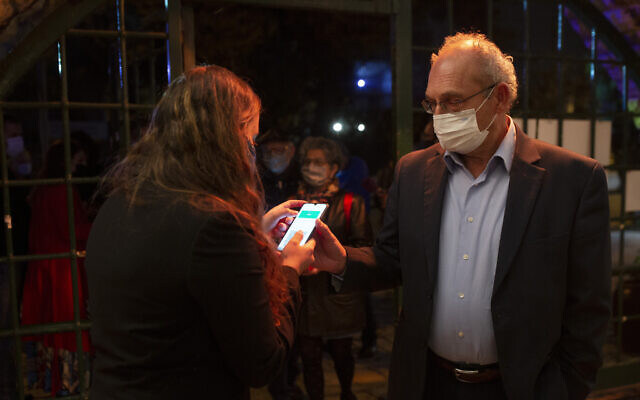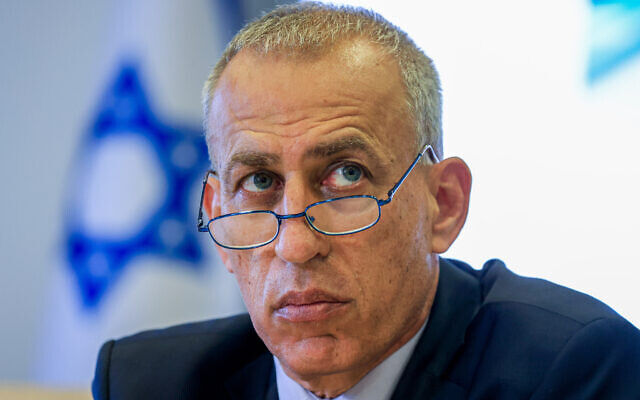Ministry says old passes will still be valid for a few more days, after website is unable to keep up with demand for permits

The planned launch Sunday of new rules for the Green Pass ground to halt within hours as a Health Ministry system crashed, preventing Israelis from obtaining their new permits.
In the wake of the snag, the Health Ministry announced that existing Green Passes, which had been set to expire at midnight Saturday, would continue to be valid for the coming days.
The plan had been that all existing Green Passes, which grant access to public venues for those who are inoculated against COVID-19 or have recovered from it or have recently tested negative, would expire on October 3 and new passes issued under tighter terms — primarily that holders must have had at least both vaccine shots and a third booster dose.
The change would have seen nearly two million Israelis lose their Green Pass rights, but with the system down, they now have a few more days to enjoy its benefits, which include access to places including restaurants and gyms.
However, those who are eligible for the Green Pass and tried to obtain it from a dedicated Health Ministry website were confronted on Sunday morning with a Hebrew message saying the site was undergoing maintenance.
The Health Ministry later issued a statement announcing that existing permits would not expire just yet.

Under the new rules, Green Passes will only be issued to those who have had either the first two or all three vaccine shots, and will only be valid for six months beginning a week after the last dose. In addition, those who have recovered from COVID-19 can get a Green Pass valid for six months after their recovery date, or for six months after receiving a single follow-up vaccine dose.
All existing Green Passes will be voided.
A temporary Green Pass can also be obtained through a negative virus test, which must be paid for unless the individual is not eligible for vaccination. It is only valid for a few days at most.
Israel — the first country to officially offer a third dose — began its COVID-19 booster campaign on August 1, initially rolling it out to those over the age of 60. It then gradually dropped the eligibility age, eventually expanding it to everyone aged 12 and up who received the second shot at least five months ago.
The high-level coronavirus cabinet is set to convene on Sunday for the first time in over a month. The Health Ministry, which in recent weeks had been pushing for more caps on gatherings, will not advocate for additional health regulations, director-general Nachman Ash said Sunday.

The meeting will instead focus on coronavirus restrictions in schools and the new Green Pass eligibility rules.
Sunday’s coronavirus cabinet meeting comes after a public spat between Prime Minister Naftali Bennett and health officials over the imposition of new restrictions, which the premier opposes. In a briefing with Israeli journalists in New York, Bennett accused the medical experts advising the government of “not seeing the full picture” and stressed that they don’t make the final decisions — the government does.
Health Minister Nitzan Horowitz called the comments “unnecessary and unfortunate,” while Ash said that the words were unexpected and “unpleasant.”
On Saturday, Bennett said that it was “still too early to celebrate” despite signs that the current wave of COVID-19 is waning.
“We are at a critical stage,” the premier said in a statement, with the reopening of the education system and the intention to end large-scale quarantines and move to a model of extensive testing and the quarantine of verified cases only.
“It is precisely now that we must be strict about the Green Pass, be careful and not become complacent,” he added, calling on all those who are not fully vaccinated to do so as soon as possible.
As the new, more restrictive regulations were set to come into effect, Israel continued to show signs it is coming out of its fourth COVID-19 wave. On Friday, the number of Israelis hospitalized in serious condition due to COVID-19 dropped below 600 for the first time since August 17, according to figures from the Health Ministry.
By Saturday, the number of active cases had slid to 44,390, continuing a recent downward trend. Two deaths took the toll since the start of the pandemic to 7,778.
The average daily new caseload last week was 3,854, according to Health Ministry figures released Saturday. The week before, it was 5,758, and 7,766 the week before that.
As reported by The Times of Israel
